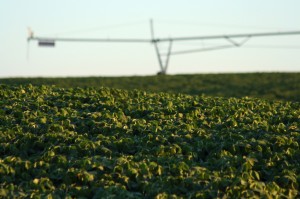Emerging Technology Trends in Agriculture
 As with any industry, technology is changing the way farmers manage nearly every aspect of their farming operations. New developments in technology are making it possible for farmers to be more productive, from the seeds they put into the ground, to the machinery they use to plant and harvest their crops, to the data they obtain about their fields, to the ways they monitor and grow those crops. Keeping up to date on the latest technology in each of these areas is critical to staying ahead of the curve, and to caring for the land in the best way possible.
As with any industry, technology is changing the way farmers manage nearly every aspect of their farming operations. New developments in technology are making it possible for farmers to be more productive, from the seeds they put into the ground, to the machinery they use to plant and harvest their crops, to the data they obtain about their fields, to the ways they monitor and grow those crops. Keeping up to date on the latest technology in each of these areas is critical to staying ahead of the curve, and to caring for the land in the best way possible.
Some of the most innovative technological advances in agriculture are in the area of crop biotechnology. Scientists now understand more about seed genetics than ever before in history, and are creating highly specialized seeds that are able to perform in many varying types of fields with an astonishingly high degree of specificity. Faced with a growing world population, farmers in the US and around the world will need to double food production to meet the demand by 2050, according to United Nations figures and reported by Robert T. Fraley, executive vice president and chief technology officer for Monsanto Company.
Speaking to a group at a Farm Journal forum last year, Fraley explained how biotechnology and communication technology will converge to create even more remarkable innovations in the industry. “‘The farm tractor today has more computer power than the first spaceship that went to the moon,’ he said, explaining that DeKalb will launch a FieldScripts program in 2014 that will help farmers vary planting within 10-by-20-meter grids. The program will match the best seed and planting rate with zones on a farm.”
As Fraley reported and many producers can already attest, technological advances in machinery go hand in hand with the types of seeds that are being planted. Farmers are taking advantage of different software programs and GPS technology that work together to help them plot their fields, dividing them into specified groups based on characteristics such as soil type. These software programs also keep track of yields and many other types of data.
Aside from these innovations, farm machinery is also steadily advancing, making planting, spraying, and harvesting more efficient and accomplished with greater ease. For instance, farmers are now able to use direct injection sprayers that can apply different chemicals at variable rates. These sprayers eliminate the need to mix chemicals in a separate tank, thereby eliminating the need to clean the tanks. They also lessen exposure to the chemicals by the operator, and put less excess product on the ground. An in-cab control console allows the farmer to control the rates at which the chemical is applied.
Technological advances are also present in irrigation and drought management practices. Especially after 2012’s drought, farmers are focused on using their water resources as efficiently and economically as possible. They are taking advantage of software that monitors their pivots’ output and texts them when the pivot has completed its circle or has encountered a problem, saving time and money. Innovations that peek under the soil in the form of highly advanced soil moisture probes are increasingly being utilized by farmers to ensure that their crops are getting the right amount of moisture at the correct depth and at the right time during the plant’s growth cycle. These moisture probes are able to communicate directly to a computer or smartphone, so that producers can stay on top of their crop’s progress at all times and from any location. Another developing irrigation technology are variable rate pivots that can be programmed to water less or more based on different aspects of the field.
Today’s advancing farm technology makes it an exciting time to be in agriculture, and farmers are doing important work by using it to grow the crops that feed their families and the world. Our UFARM managers understand the importance of this emerging technology and can help landowners determine what kinds of technology are valuable to have on their farm.
Sources: (Thompson, Boyce. “Fraley: Technology Will Be Key to Feeding the World Population.”Farm Journal. Agweb.com. 5 Dec. 2013. Web. 6 Feb. 2014.)

